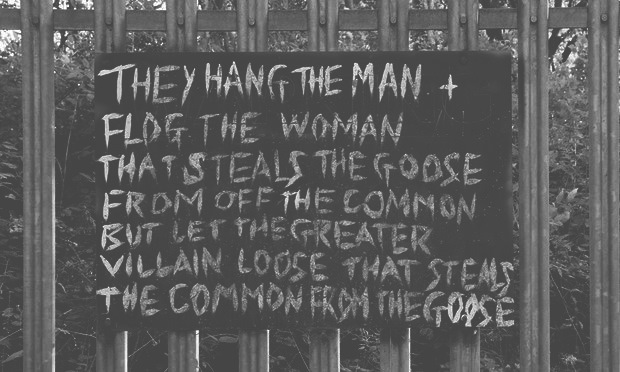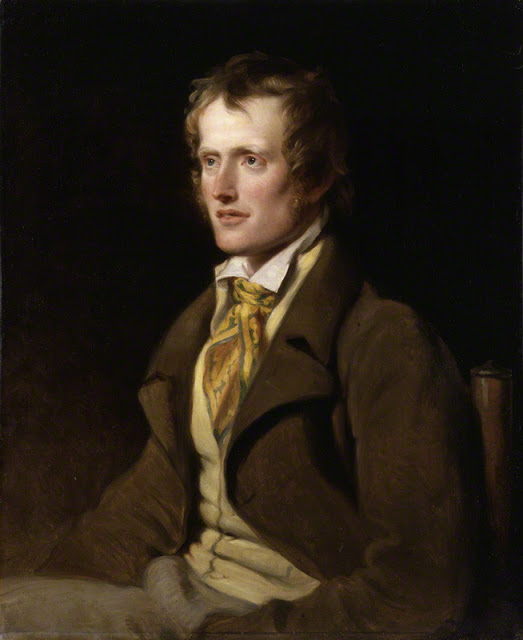
Prior to the enclosures in England, a portion of the land was categorized as “common” or “waste”. “Common” land was under some kind of collective control. Called the open field system, a single plot of land was divided among groups, often a lord and employed or participating peasants. This facilitated common grazing and crop rotation.”Waste” was the only land not officially claimed by any group, often cultivated by landless peasants.
*
In her book about the wonder of childhood “Kith,” Jay Griffiths writes about the effects the Enclosures had on ordinary people.
“It is hard today to imagine what children’s lives were like before the Enclosures and it is impossible to overstate the terrible, lasting alteration which those Acts made to childhood in Britain.
Although it is not, in the great scheme of things, so very long ago, we today are effectively fenced off from even its memory.“…
” The commons was home for boy or bird but the Enclosures stole the nests of both, bereaved children of the site of their childhood, robbed them of animal- tutors and river- mentors and stole their deep dream – shelter. The great outdoors was fenced off and marked “TRESPASSERS WILL BE PROSECUTED.“…
” Over the generations, as the outdoors shrank, the indoor world enlarged in importance.“…
*
Before the Enclosures commons and heaths were essentially a shared resource where the poor could keep a cow, gather fallen branches for firewood, plant crops and hunt.
These were also the places of ancient carnival, traditional festival and children’s free play. The enclosures transformed this cultural heritage and had a deep, haunting effect on the psyche of the pastoral poet John Clare.
*
” The Enclosures threw the peasantry into that acute poverty which would scar Clare’s own life and mind so deeply. His grief stricken madness, alcoholism and exile as a result of this land – loss encapsulates in one indigenous life the experience of so many indigenous cultures.“…
” By 1816, poachers, including children of nine or ten, were given punishments of imprisonment or transportation of offences against the Games Laws, enacted to protect the hunting rights of the wealthy.”…” “The games of the gentry – hunting for fun – were fiercely protect, while hunting for sheer starving necessity, engaged in by children and adults was outlawed.”
…” The 1794 Report on Enclosures in Shropshire states with nasty approval that a result of the Enclosures would be that ” the labourers will work every day in the year, their children will be put out to labour early.” Children’s hard labour would become necessary for survival as families lost one right after another, including gleaners rights to leaze after the harvest.”
Griffiths continues…. ” I have been with Amazonian people when they have seen the searing brutality of their lands being ripped apart for gold in today’s act of corporate enclosure, and I have watched men weep while they say aghast, ” We are the land,” a truth which John Clare would have effortlessly understood.”
*
Governments often legislate in favour of corporations and private enterprises giving them mandates to compromise the well being of the natural environment and the local communities that work and live in them to make a profit. From local battle grounds such as Freeman’s Wood to the contravening of treaty laws which allow the continuation of the Dakota pipeline, from fracking to the wholesale expulsion of tribal communities from the Amazon, there are many contemporary examples of this.
More and more of the natural world is being patented, privatized and fenced off from children and adults alike. As a result birthrights such as clean water, air and the freedom to roam are slowly becoming commodities sold for profit.
The poem below is by John Clare. To me it is a wild cry of the land for its children and the children for their birthright, the land. It rings with the call of the warbler for its secret nest among the pines and the fox’s silent plea to the hunter’s horn. It resonates with that deep longing we carry for re-connection with our natural human and humane state,honest as the trees, animals and dark skinned earth; our home. It is the yearning to live free of laws made to enlarge the estates of an elite few as the many lose their access to the land.
The Elm tree of the poem was felled during the Enclosures. From it a carpenter friend of Clare’s, fashioned a wooden ruler as a keepsake and symbol of the value of measured gain over incalculable loss.

To a Fallen Elm
Old Elm that murmured in our chimney top
The sweetest anthem autumn ever made
And into mellow whispering calms would drop
When showers fell on thy many coloured shade
And when dark tempests mimic thunder made
While darkness came as it would strangle light
With the black tempest of a winter night
That rocked thee like a cradle to thy root
How did I love to hear the winds upbraid
Thy strength without while all within was mute
It seasoned comfort to our hearts desire
We felt thy kind protection like a friend
And pitched our chairs up closer to the fire
Enjoying comforts that was was never penned
Old favourite tree thoust seen times changes lower
But change till now did never come to thee
For time beheld thee as his sacred dower
And nature claimed thee her domestic tree
Storms came and shook thee with aliving power
Yet steadfast to thy home thy roots hath been
Summers of thirst parched round thy homely bower
Till earth grew iron – still thy leaves was green
The children sought thee in thy summer shade
And made their play house rings of sticks and stone
The mavis sang and felt himself alone
While in they leaves his early nest was made
And I did feel his happiness mine own
Nought heeding that our friendship was betrayed
Friend not inanimate- tho stocks and stones
There are and many cloathed in flesh and bones
Thou ownd a language by which hearts are stirred
Deeper than by the attribute of words
Thine spoke a feeling known in every tongue
Language of pity and the force of wrong
What cant assumes what hypocrites may dare
Speaks home to truth and shows it what they are
I see a picture that thy fate displays
And learn a lesson from thy destiny
Self interest saw thee stand in freedoms ways
So thy old shadow must a tyrant be
Thoust heard the knave abusing those in power
Bawl freedom loud and then oppress the free
Thoust sheltered hypocrites in many an hour
That when in power would never shelter thee
Thoust heard the knave supply his canting powers
With wrongs illusions when he wanted friends
That bawled for shelter when he lived in showers
And when clouds vanished made thy shade amends
With axe at root he felled thee to the ground
And barked of freedom – O I hate that sound
It grows the cant terms of enslaving tools
To wrong another by the name of right
It grows a licence with oer bearing fools
To cheat plain honesty by force of might
Thus came enclosure- ruin was her guide
But freedoms clapping hands enjoyed the sight
Tho comforts cottage soon was thrust aside
And workhouse prisons raised upon the site
Een natures dwelling far away from men
The common heath became the spoilers prey
The rabbit had not where to make his den
And labours only cow was drove away
No matter- wrong was right and right was wrong
And freedoms brawl was sanction to the song
Such was thy ruin music making Elm
The rights of freedom was to injure thine
As thou wert served so would they overwhelm
In freedoms name the little so would they over whelm
And these are knaves that brawl for better laws
And cant of tyranny in stronger powers
Who glut their vile unsatiated maws
And freedoms birthright from the weak devours.









Awesome post.
ReplyDeleteBeautiful poem.
ReplyDeleteI agree with you about our children living inside instead of out. I often get asked for advice on children and my first words are..."get outside as much as you can". Our children need it, we need it.
Have a lovely weekend.
This makes me soooooooooooooooo sad. I dont know what else to say. Its horrible.
ReplyDeleteThankyou so much for this post. Its lovely
U care so much
Thankyou
Its inspiring
i have never heard of the enclosures before, but the explanation of it is reminding me of the story "the Hunger games". unbelievable. i wish so much that we lived in the woods too, just like i did when i was a kid. we live in a "country" neighborhood, but still not the same. and my oldest unfortunately does not like the outdoors at all (bugs, to hot, dirt!), and i am wondering if we conditioned him that way with too many video games and tv, or perhaps that is just some kids' personalities .... you know, i want to take away the video games, but that is basically the only way he connects with his friends- they play them together. so if i take them away, it's like i am taking his friends away too. it's just a disaster- this american or modern childhood :( - wishing i could go back and do it all differently sometimes.
ReplyDeleteTrue, all of it. Still looking for those hobbit holes... :)
ReplyDeleteVery interesting. I knew about the enclosures, but had never read this poetry or knew of the human cost of that massive social change. I think we all need nature, but in different ways. I was raised in the city but always near wild places, and spent many happy hours up trees. However, I am really a homebody at heart and never enjoyed camping or fishing. I would far rather curl up with a book, knitting, embroidery... and have been like that as long as I can remember. My own two children are complete opposites in this regard. My son spent loads of time building forts and doing outdoor sports, my daughter hates getting her hands dirty. After two years of being housebound with illness, she is much more observant of the changes of nature around her, and says that she always feels better when she can get out into nature.
ReplyDeleteThank you for the link to the book it sounds really interesting. I agree about nature, nurturing us, I have posted about being outdoors quite a bit recently I too feel it is so important. But I feel immensely blessed now, blessed that I do have wide open green spaces outside my door and that when my children are ready for it they will roam alone or together or with friends. A lovely, lovely post thank you for sharing.
ReplyDelete